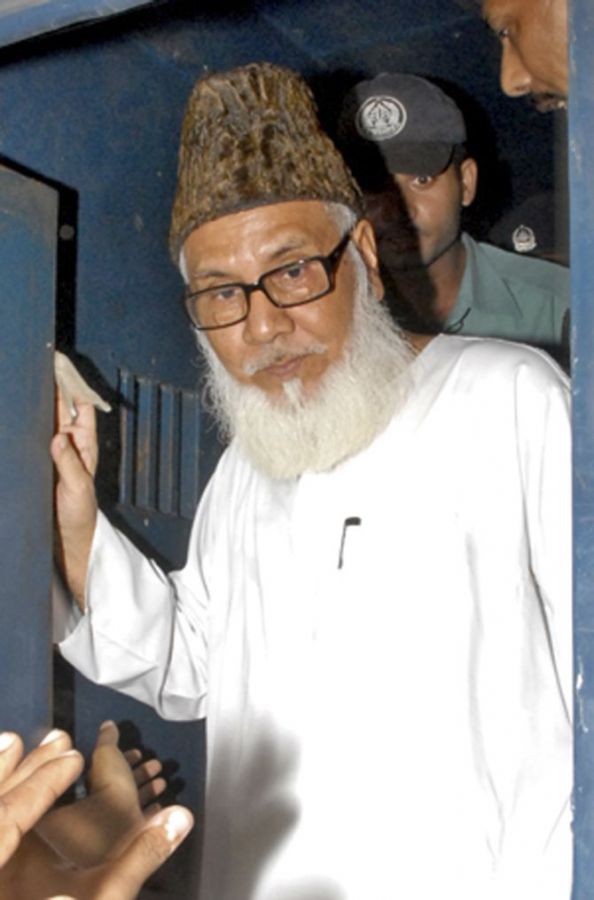 Bangladesh's fundamentalist Jamaat-e-Islami chief Motiur Rahman Nizami was on Wednesday sentenced to death by a special tribunal for his role in the killing of thousands of people during the nation's independence war against Pakistan in 1971.
Bangladesh's fundamentalist Jamaat-e-Islami chief Motiur Rahman Nizami was on Wednesday sentenced to death by a special tribunal for his role in the killing of thousands of people during the nation's independence war against Pakistan in 1971.
"He shall be hanged by neck until he is dead," pronounced Enayetur Rahim, the chairman of the three-member panel of judges of Bangladesh's International Crimes Tribunal.
The verdict delivered in a packed court room amid tight security said 71-year-old Nizami deserved no punishment other than the death penalty for the gravity of crimes he had committed.
The court said in the unanimous verdict that eight of the 16 charges levelled against the Jamaat leader were proved beyond doubt.
The charges included leading the execution of intellectuals, mass killing, rape and loot during the nine months of bloodshed 43 years ago.
Witnesses said Nizami was present on the dock and looked indifferent as the judges read out the 204-page judgment in turns which took more than an hour to be delivered.
"It would be a failure of justice, unless he is handed down the death penalty," the verdict said.
The tribunal said Nizami misinterpreted Islam in carrying out the atrocities and as the then president of Islami Chhatra Sangha -- the student wing of Jamaat -- he turned the organisation into infamous Al-Badr militia forces to carry out mass killings, particularly of the leading intelligentsia.
The panel convicted him of "superior responsibility" as the chief of Al-Badr militia for direct involvement in the killings and tortures in other charges.
Under the law for the war crimes trial, Nizami could challenge the verdict before the apex Supreme Court.
Nizami's lawyers said they planned to file an appeal before the apex court.
Nizami, a former minister in the Bangladesh Nationalist Party-led four party alliance government during its 2001-2006, was the last high-profile accused to be brought to justice on war crimes charges as the two special tribunals set up by the Awami League have so far pronounced verdicts in 10 cases of war crimes.
The charges against Nizami include the murder of 70 people and torching of 72 houses in Pabna's Bera Upazila, killing 450 people in Demra and Baushia villages and killing many more in front of a Hindu temple in Santhiya Upazila.
The judgment ended a major phase in the war crimes trial during the liberation war.
Immediately after the judgment, Jamaat protested the verdict and issued a statement calling a three-day nationwide general strike to be observed on Thursday, Sunday and Monday.
The government ordered tight security vigil ahead of the verdict deploying paramilitary Border Guard Bangladesh troops and elite anti-crime Rapid Action Battalion to guard the major cities and areas known to be Jamaat strongholds.
"Stern actions will be taken against those who would try to carryout subversive activities or cause law and order situation," State Minster for Home Asaduzzaman Khan Kamal had said ahead of the verdict.
Meanwhile, hundreds of youngsters under a banner called "Ganojagaron Manch" and the 1971 freedom fighters expressed their satisfaction with the verdict as many of them were seen crying outside the court complex.
The tribunal on June 24 deferred Nizami's verdict after the jail authorities reported that the accused was unable to appear in the court due to high blood pressure.
In consultation with both the prosecution and defence lawyers, the tribunal had deferred the verdict at that time.
During the indictment, Nizami had pleaded "not guilty" and said the then Pakistan People's Party leader Zulfiqar Ali Bhutto was entirely responsible for the genocide in 1971.
Two special tribunals so far handed down death penalties to eight people on 1971 war crime charges and ordered two others to languish in jail until their death as they so far completed the trial of 11 war crimes key-accused.
Only one of them, Jamaat's joint secretary general Abdul Quader Mollah has been executed.
Of the 10 convicts, eight are Jamaat stalwarts and the rest two are leaders of its crucial ally BNP of ex-prime minister Khaleda Zia.
About three million people were killed by the Pakistani army and their Bengali-speaking collaborators during the liberation war, according to official estimates.
A special tribunal has already sentenced Nizami and 13 others, including a top leader of India's separatist outfit United Liberation Front of Assam, to death in the 2004 Chittagong arms cases.
Lawyers said Nizami's case took the longest time to be disposed since Bangladesh witnessed the launch of the war crimes trial in 2010 in line with ruling Awami League's 2008 election pledges.
"It's a sham of a judgment this verdict will never stick...it is a most unhappy judgment," Nizami's chief counsel Tajul Islam said. But prosecution lawyer Mohammad Ali said, "The verdict established the rule of law.”
"The tribunal has announced a historic verdict. The prosecution was able to prove beyond doubt eight among the 16 charges against him," Ali said.
Several leaders of the ruling Awami League said they were happy with the judgment.
"The tribunal acted entirely beyond the influence of the government while the government extended its hand to the court providing the logistics and other required supports," Law Minister Anisul Huq said.
Hearing on 10 cases is still underway at the two tribunals as four others await verdict after the wrap up of the hearing in their cases.
Nizami's verdict came five days after another war criminal and former Jamaat chief Ghulam Azam died aged 92 in the prison cell of a specialised hospital while he was serving imprisonment "until death" for crimes against humanity during the Liberation War.











 © 2025
© 2025